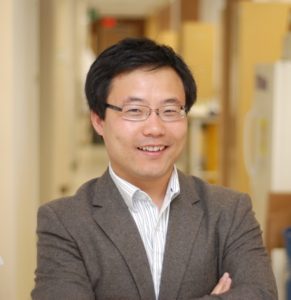 Dr. Weian Zhao is an Associate Professor at the Sue and Bill Gross Stem Cell Research Center, Chao Family Comprehensive Cancer Center, Department of Biomedical Engineering, and Department of Pharmaceutical Sciences at University of California, Irvine. Dr. Zhao is also the co-founder of Velox Biosystems Inc, Baylx Inc, and Amberstone Biosciences LLC, start-up companies that aim to develop technologies for rapid diagnosis, stem cell therapy, and drug discovery, respectively. Dr. Zhao’s research aims to 1) elucidate and eventually control the fate of transplanted stem cells and immune cells to treat cancer and autoimmune diseases, and 2) develop novel miniaturized devices for early diagnosis and monitoring for conditions including sepsis, antibiotic resistance and cancer. Dr. Zhao has received several awards including the MIT’s Technology Review TR35 Award: the world’s top 35 innovators under the age of 35 and NIH Director’s New Innovator Award. Dr. Zhao completed his BSc and MSc degrees in Chemistry at Shandong University and then obtained his PhD in Chemistry at McMaster University in 2008. During 2008-2011, Dr. Zhao was a Human Frontier Science Program (HFSP) Postdoctoral Fellow at Harvard Medical School, Brigham and Women’s Hospital and MIT.
Dr. Weian Zhao is an Associate Professor at the Sue and Bill Gross Stem Cell Research Center, Chao Family Comprehensive Cancer Center, Department of Biomedical Engineering, and Department of Pharmaceutical Sciences at University of California, Irvine. Dr. Zhao is also the co-founder of Velox Biosystems Inc, Baylx Inc, and Amberstone Biosciences LLC, start-up companies that aim to develop technologies for rapid diagnosis, stem cell therapy, and drug discovery, respectively. Dr. Zhao’s research aims to 1) elucidate and eventually control the fate of transplanted stem cells and immune cells to treat cancer and autoimmune diseases, and 2) develop novel miniaturized devices for early diagnosis and monitoring for conditions including sepsis, antibiotic resistance and cancer. Dr. Zhao has received several awards including the MIT’s Technology Review TR35 Award: the world’s top 35 innovators under the age of 35 and NIH Director’s New Innovator Award. Dr. Zhao completed his BSc and MSc degrees in Chemistry at Shandong University and then obtained his PhD in Chemistry at McMaster University in 2008. During 2008-2011, Dr. Zhao was a Human Frontier Science Program (HFSP) Postdoctoral Fellow at Harvard Medical School, Brigham and Women’s Hospital and MIT.
Read Dr Zhao’s Emerging Investigator article “Functional TCR T cell screening using single-cell droplet microfluidics” and read more about him in the interview below:
Your recent Emerging Investigator Series paper focuses on functional TCR T cell screening using single-cell droplet microfluidics. How has your research evolved from your first article to this most recent article?
I was trained as a colloidal and surface chemist. My first paper back when I was a PhD student was about building nanostructures using DNA as a template. Over the years, my research has evolved towards addressing immediate, major unmet need in biology and medicine; this is achieved by developing new tools and technologies, often using an interdisciplinary and collaborative approach, as exemplified by this new paper.
What aspect of your work are you most excited about at the moment?
It is the perspective that what we do in research can potentially solve real-world problems and help the patients in a short term. Like this new paper illustrated, our single-cell system holds great potential to accelerate development of cancer immunotherapeutics. There is a great and urgent demand in the clinic for many more of this type of promising drugs that can benefit patients who do not have lots of time to wait.
In your opinion, how can droplet microfluidic technologies contribute to immune-screening and immuno-therapy and personalised medicine in general?
Droplet microfluidic technologies and other exciting single-cell systems being developed in our field can contribute to immune-screening, immuno-therapy and personalised medicine by significantly reducing the time needed for the discovery phase. For example, conventional screening platforms for immunologic agents such as antibodies or T cells, usually take months to years to obtain a therapeutic candidate whereas the new single-cell platforms can potentially do this in the matter of days to weeks. In this new paper, this ability is enabled by directly interrogating the “functions” of individual cell clones in greater depth by using single-cell analysis. As biological samples are heterogeneous, this key information is often lost in conventional, population based studies.
What do you find most challenging about your research?
It is always the people. I take time to identify and build the right team that, once in place, can almost conquer any challenges in research itself. I also wish I could spend more time to do research rather than writing grants.
In which upcoming conferences or events may our readers meet you?
IEEE EMBS Micro & Nanotechnology in Medicine 2018, Physical Science of Cancer (GRS) 2019, and PEGS 2019
How do you spend your spare time?
Mostly with the family, and watching Manchester United games.
Which profession would you choose if you were not a scientist?
Probably try to become a football manager in the English Premier League. There is a lot of similarity in running a research laboratory and running a football club, isn’t there?
Can you share one piece of career-related advice or wisdom with other early career scientists?
Ask for help and mentorship from people who have succeeded in what you are trying to do. Try to accelerate your progress through collaboration and partnership.










